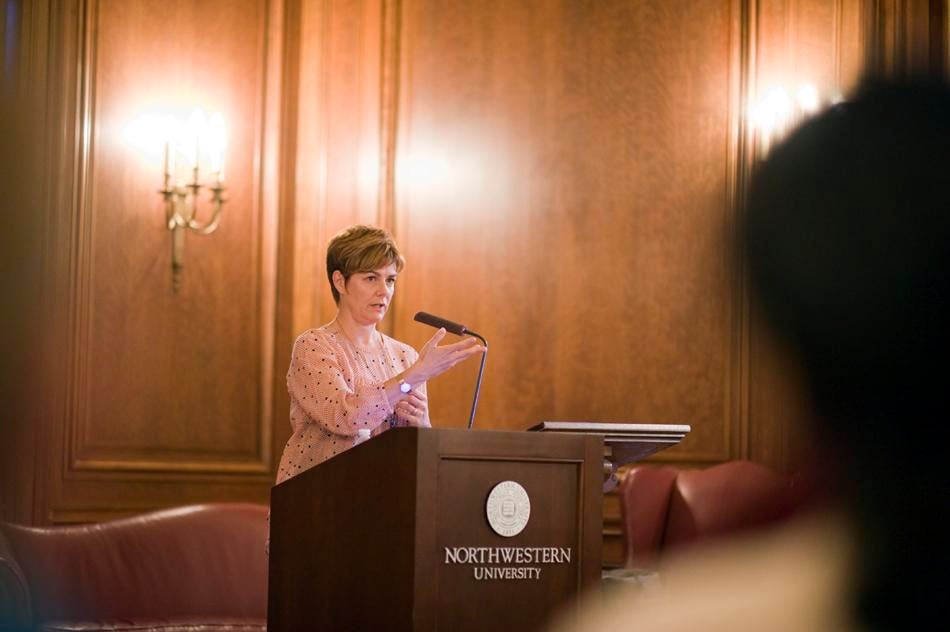Northwestern alum shares criticisms of global aid industry
Sean Su/The Daily Northwestern
Jillian Reilly, a global aid worker, addresses NU in a speech about her discoveries in her work in humanitarianism. She said through her career, she found many shortcomings in the aid industry and is now attempting to increase awareness regarding these issues.
May 6, 2014
Jillian Reilly returned to Northwestern Tuesday evening after more than two decades in the global aid industry to share a skeptic eye on humanitarianism.
The event, titled “Confessions of an Aid Worker in Africa,” was held in Harris Hall and co-sponsored by the Buffett Center, the Program of African Studies and One Book One Northwestern. For about 30 minutes, Reilly (Weinberg ’92) spoke about the often pessimistic reality of the aid industry.
The event was named after her latest book, “Shame – Confessions of an Aid Worker in Africa,” which she said was a “coming-of-age story” that documents her memories in Africa.
Reilly said she took off to South Africa during its final apartheid days to intern as an aid worker. With a fresh degree in African history and English literature, she started off working to facilitate the historic 1994 South Africa elections before moving on to tackle projects across Africa, Asia and Eastern Europe, which she pursued for the next 15 years.
Her decision in 2000 to return to the U.S., abandoning working overseas, was out of disillusionment of an industry that she said was “more part of a problem than a solution.” Now, she gives talks on building an understanding between “the developed and the developing.”
“What I’m trying to do through talks like this and my book is … getting people in both the NGO and charity sector and outside of it to kind of come at it with the most honesty and the most bravery that they can,” Reilly told The Daily before the speech.
Prior to the event, Reilly had dinner with about 20 students from the Global Engagement Studies Institute program who returned from studying abroad in an effort to connect with students interested in social change.
After the dinner, Reilly began her speech at the beginning of her journey – studying as an NU history major more than two decades ago. She remembered learning Africa’s story and firmly telling her parents, “I’m going to South Africa” to be a part of the social change, she said.
“It’s good to be back,” Reilly told The Daily before the event. “To be reminded of what doesn’t change and what does … It’s been almost 20 years since I’ve been (at NU), but a lot of the problems and the challenges … are still there.”
Eager to enact change, Reilly rose in ranks at the nonprofits she worked at in her early twenties. She quickly got plugged in and witnessed the bureaucracy behind the aid industry. She said this was what had worn her out.
“The more powerful I got the easier it was for people to tell me exactly what I wanted to hear,” Reilly said.
Her success came in the form of “pushing paper” and writing more reports, Reilly said. Working in aid seemed more like a multi-million dollar business, Reilly said. The aid workers drove “the biggest cars in town” and had “the most money,” Reilly said regarding the corrupt aid system.
Reilly concluded her speech by addressing the rift in perspective between aid workers and their clients, saying that she does understand how debilitated individuals in different countries feel when they are looked at as a “bundle of problems.” After her speech, she held an hour long question-and-answer session.
Caroline Katba, a junior at Amherst College studying at NU’s School of Continuing Studies, this year through a exchange program, said she respected Reilly’s frank realism.
“It was admirable of her bravery and her courage to actually use the word ‘shame,’” Katba said.
Alpha Diallo (Law ’11), who currently practices human rights law and is an immigrant from Guinea, West Africa, said Reilly effectively touched on issues of aid throwing money at problems instead of addressing core issues.
“If they really want to help these people and their countries … instead of giving me fish, why not show me how to fish?” Diallo said.
Email: [email protected]
Twitter: @alice__yin


